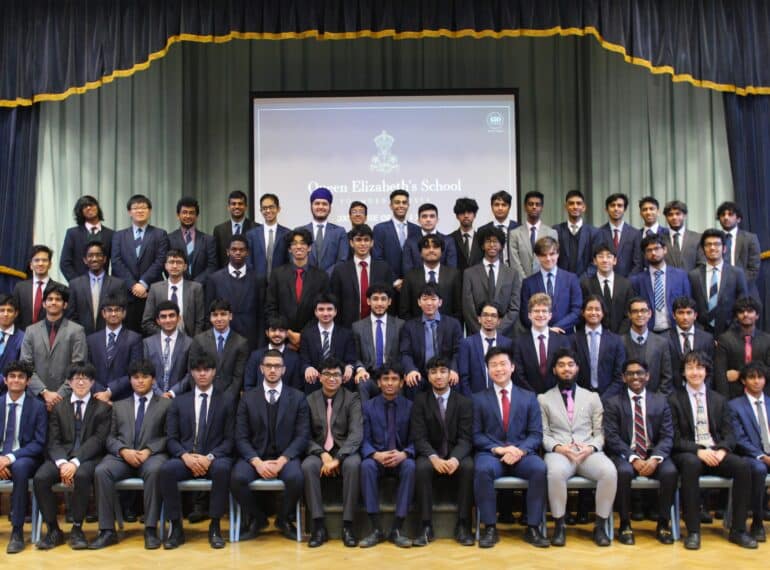
Queen Elizabeth’s School has set a new all-time record for the number of places offered by Oxford and Cambridge universities, with the 2024 figure of 62 offers easily surpassing the previous school record of 47, set only last year.
There were record numbers of offers from both universities – 46 from Cambridge and 16 from Oxford – with just over one in three boys in Year 13 receiving an Oxbridge offer.
The offers cover a wide range of disciplines – from Law and Medicine to History and Asian & Middle Eastern Studies – and come from 33 colleges.
Headmaster Neil Enright said: “This is brilliant news! It’s a huge jump up from last year’s figure of 47, which itself comfortably exceeded our previous record of 40.
“These offers are testament to the academic accomplishment and sustained application of these students, both in public examinations and in their university admissions tests.
“They also demonstrate that these candidates were able to a make a convincing case at interview, where they were invariably up against very stiff competition. I would like to take this opportunity to thank the many Old Elizabethans and other friends of the School who conducted mock interviews with our boys in the autumn.
“This record is a very auspicious start to our new QE Futures programme, which seeks to further refine and enhance university admissions support and preparation, building on much excellent work embedded here over recent years.”
The highest number of offers came from the following colleges:
- Queens’, Cambridge – five
- St Catharine’s, Cambridge – five
- Trinity, Cambridge – four
There were: 18 offers for Medicine: eight for Economics, or Economics and Management; eight for Engineering; seven for Mathematics, as well as smaller numbers for other subjects, including famous courses such as Cambridge’s Natural Sciences and Oxford’s PPE (Philosophy, Politics and Economics).
Digging down into the statistics reveals a steady improvement in QE’s offer-to-application and offer-to-interview ratios over the past five years. This year, 90% of Oxford and Cambridge applicants were called for interview and 49% of applicants offered a place.
Assistant Head (Pupil Destinations) James Kane, who heads QE Futures, said: “To have reached a point this year where very nearly half our Oxford and Cambridge applicants have received an offer demonstrates how strong those ratios have become.
“We are confident that these students will make a positive impact on the life of their respective colleges and universities. Of course, receiving an offer is not the end of the process: the hard work continues as these boys strive to meet the conditions of their offers.
“There has been an encouraging picture more broadly, with other students securing a range of offers from other leading institutions: 344 offers so far across 119 courses at 32 different universities.
“As ever, we are mindful that there are some strong and credible candidates disappointed at not receiving the offers for which they had hoped.”

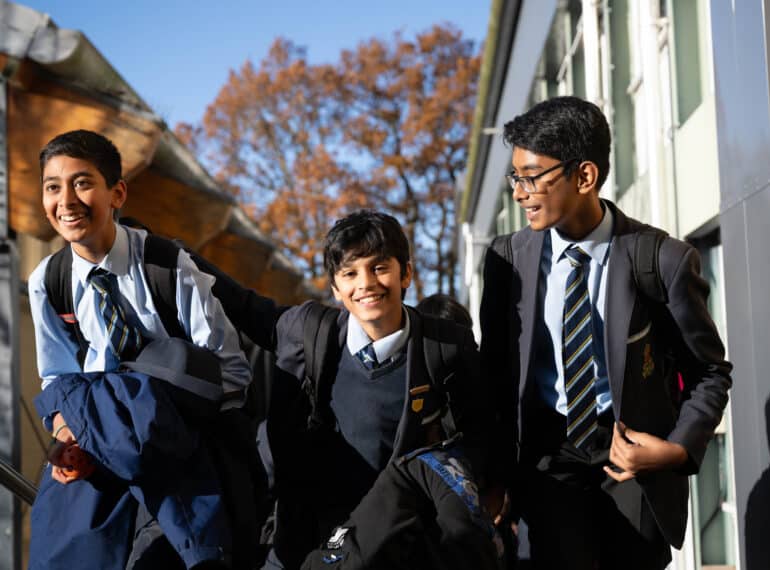
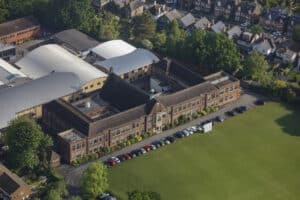 QE has now taken first or second place in the survey every year for well over a decade. The table is based on A-level and GCSE results.
QE has now taken first or second place in the survey every year for well over a decade. The table is based on A-level and GCSE results. In the article accompanying the survey, Times journalists Sian Griffiths and Helen Davies stated: “This is the first time that performance in this summer’s A-levels and GCSEs has returned to pre-pandemic grade boundaries in England and many of the schools that triumphed this year were also those that managed to keep high-quality teaching going online during the pandemic.”
In the article accompanying the survey, Times journalists Sian Griffiths and Helen Davies stated: “This is the first time that performance in this summer’s A-levels and GCSEs has returned to pre-pandemic grade boundaries in England and many of the schools that triumphed this year were also those that managed to keep high-quality teaching going online during the pandemic.”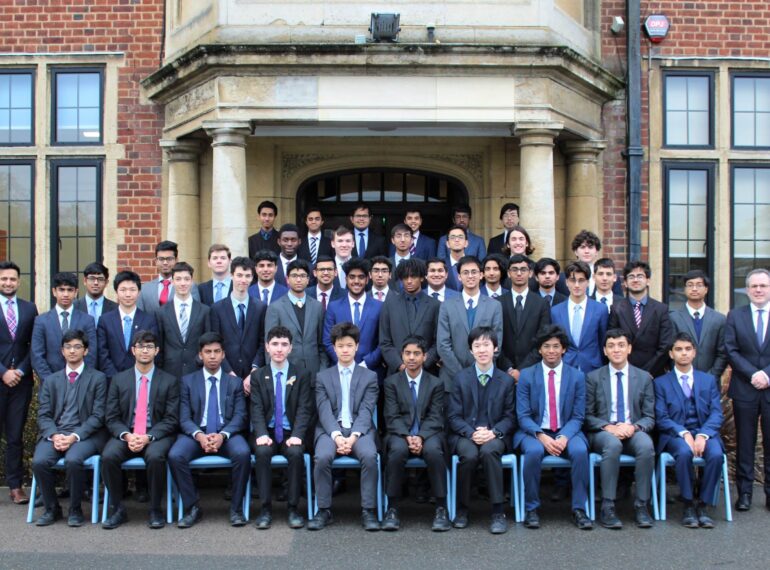
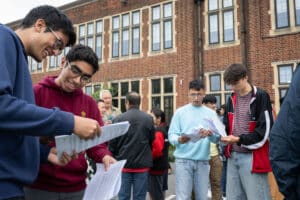 Headmaster Neil Enright said: “It is always good to receive independent corroboration of our success, and this news is a testament both to the dedication and professional expertise of our staff and to the sustained hard work of our very able students, who come from a wide range of backgrounds. Our Sixth Form team are highly experienced at guiding pupils who aspire to places at the world’s leading universities and on very competitive courses, such as Medicine.
Headmaster Neil Enright said: “It is always good to receive independent corroboration of our success, and this news is a testament both to the dedication and professional expertise of our staff and to the sustained hard work of our very able students, who come from a wide range of backgrounds. Our Sixth Form team are highly experienced at guiding pupils who aspire to places at the world’s leading universities and on very competitive courses, such as Medicine.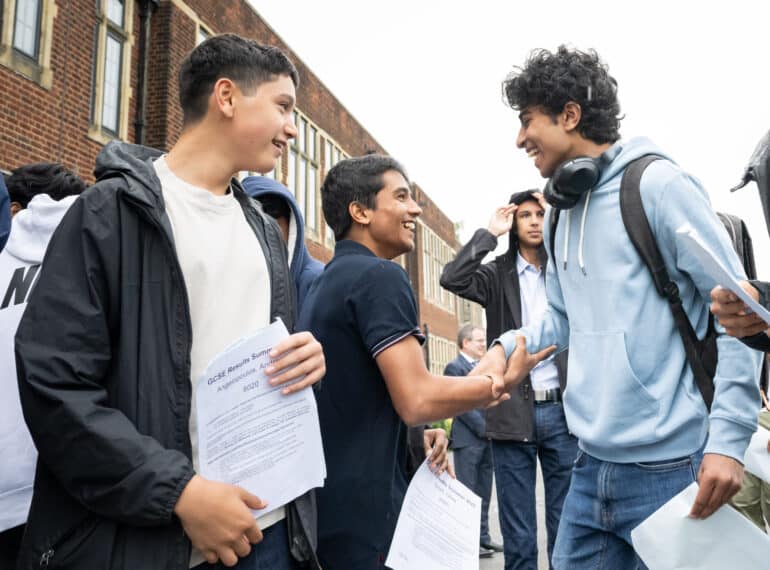
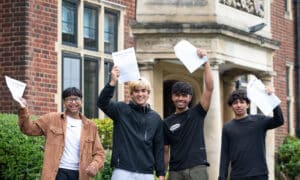 With no GCSE examinations taken in 2020 and 2021, and last year’s results adjusted because of the pandemic, all eyes were on this year’s Year 11 to see how they would compare with the 2019 cohort.
With no GCSE examinations taken in 2020 and 2021, and last year’s results adjusted because of the pandemic, all eyes were on this year’s Year 11 to see how they would compare with the 2019 cohort. Results from all departments were strong, with especially shining performances in Mathematics – where 84% of the 190 students gained a grade 9 (with no results lower than a 7) – and the sciences, with 86% of those taking individual Biology and Physics securing 9s, and 79% for Chemistry.
Results from all departments were strong, with especially shining performances in Mathematics – where 84% of the 190 students gained a grade 9 (with no results lower than a 7) – and the sciences, with 86% of those taking individual Biology and Physics securing 9s, and 79% for Chemistry.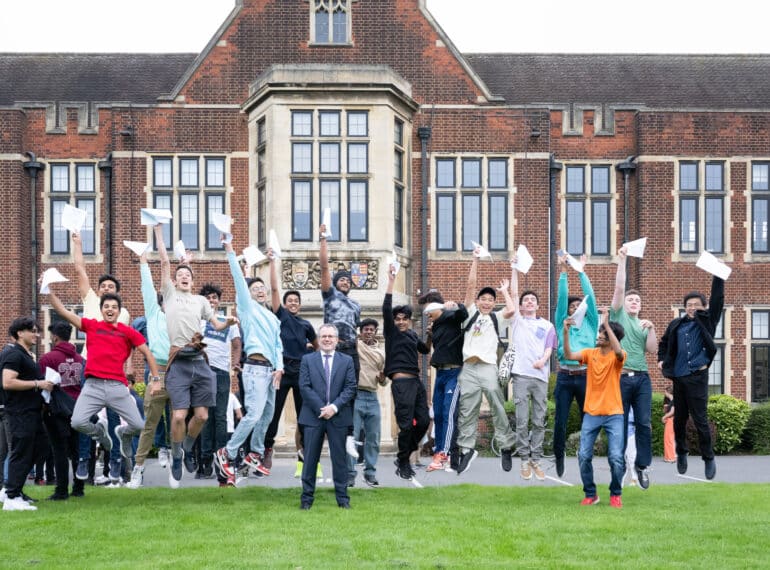
 At the highest possible grade, the School improved significantly on its 2019 figures, with 58.2% of A-levels being awarded A* – easily beating the pre-pandemic record of 46.9% set in 2018. It was a similar record-breaking performance for combined A–A*: 89.1% of A-levels had these grades, well above the equivalent figure in the pre-Covid years.
At the highest possible grade, the School improved significantly on its 2019 figures, with 58.2% of A-levels being awarded A* – easily beating the pre-pandemic record of 46.9% set in 2018. It was a similar record-breaking performance for combined A–A*: 89.1% of A-levels had these grades, well above the equivalent figure in the pre-Covid years.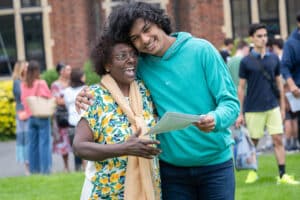 “We recognise that this Year 13 cohort has not always had an easy journey: they were unable to sit their GCSEs because of Covid, so, like their peers across the country, this was the first time they had faced high-stakes testing.
“We recognise that this Year 13 cohort has not always had an easy journey: they were unable to sit their GCSEs because of Covid, so, like their peers across the country, this was the first time they had faced high-stakes testing.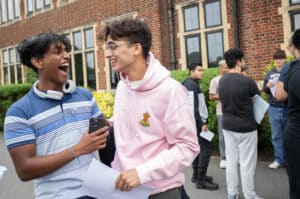 Among many successes across the subjects this year, French stands out for its 100% performance – all five candidates achieved A*.
Among many successes across the subjects this year, French stands out for its 100% performance – all five candidates achieved A*.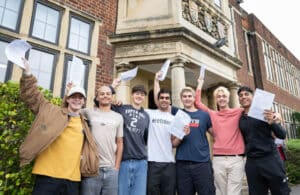 “They should be proud of the wider contribution they have made. Known for their kindness and empathy, they have supported each other as friends, and those lower in the School as peer mentors. They have also helped to establish and develop connections with the local Barnet community, such as our QE Together partnership with Queen Elizabeth’s Girls’ School.”
“They should be proud of the wider contribution they have made. Known for their kindness and empathy, they have supported each other as friends, and those lower in the School as peer mentors. They have also helped to establish and develop connections with the local Barnet community, such as our QE Together partnership with Queen Elizabeth’s Girls’ School.”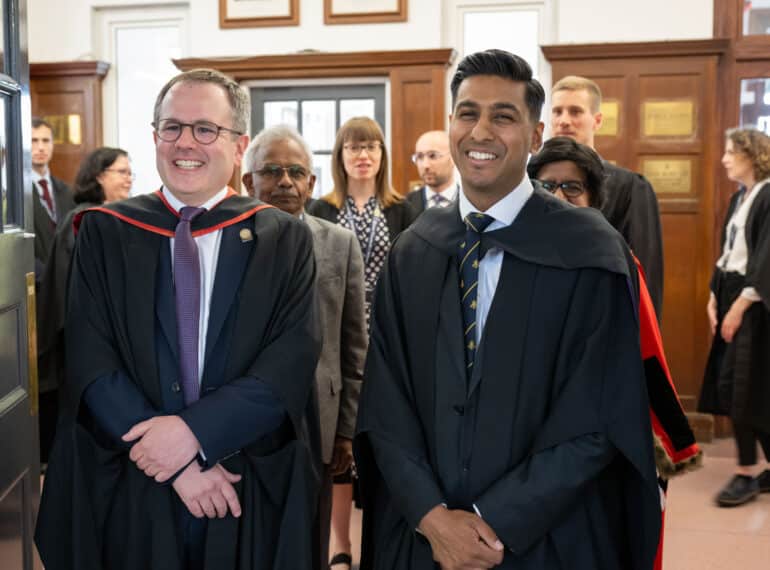
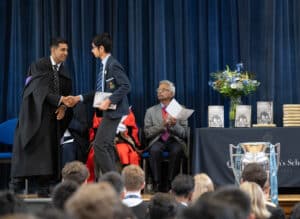 Former QE First XI cricket captain and First XV rugby player Sunil Tailor (OE 1996–2006) was the guest of honour, telling the boys that he had now united his love for sport with his career in accountancy: he is the Head of Commercial Finance at reigning Premiership champions Saracens.
Former QE First XI cricket captain and First XV rugby player Sunil Tailor (OE 1996–2006) was the guest of honour, telling the boys that he had now united his love for sport with his career in accountancy: he is the Head of Commercial Finance at reigning Premiership champions Saracens.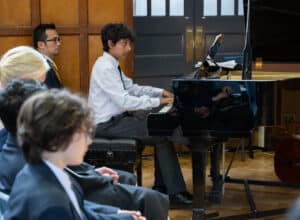 Sunil read Economics at UCL, graduating in 2009, and was a cricket coach at Middlesex from 2007–2011. He worked for more than ten years for accountancy firm MHA MacIntyre Hudson before joining Saracens in November 2022.
Sunil read Economics at UCL, graduating in 2009, and was a cricket coach at Middlesex from 2007–2011. He worked for more than ten years for accountancy firm MHA MacIntyre Hudson before joining Saracens in November 2022.